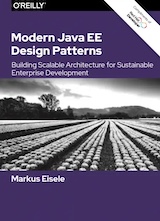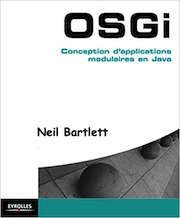
|
FreeComputerBooks.com
Links to Free Computer, Mathematics, Technical Books all over the World
|
|
- Title: Modern Java EE Design Patterns: Building Scalable Architecture for Sustainable Enterprise Development
- Author(s) Markus Eisele
- Publisher: O'Reilly Media; eBook (Compliments of Red Hat)
- Permission: Free eBook Complimented by Red Hat
- Paperback: N/A
- eBook: PDF (65 pages)
- Language: English
- ISBN-10: N/A
- ISBN-13: 978-1491939826
- Share This:

|
With the ascent of DevOps, microservices, containers, and cloud-based development platforms, the gap between state-of-the-art solutions and the technology that enterprises typically support has greatly increased. But as Markus Eisele explains in this O’Reilly report, some enterprises are now looking to bridge that gap by building microservice-based architectures on top of Java EE.
Can it be done? Is it even a good idea? Eisele thoroughly explores the possibility and provides savvy advice for enterprises that want to move ahead. The issue is complex: Java EE wasn’t built with the distributed application approach in mind, but rather as one monolithic server runtime or cluster hosting many different applications. If you’re part of an enterprise development team investigating the use of microservices with Java EE, this book will help you:
- Understand the challenges of starting a greenfield development vs tearing apart an existing brownfield application into services
- Examine your business domain to see if microservices would be a good fit
- Explore best practices for automation, high availability, data separation, and performance
- Align your development teams around business capabilities and responsibilities
- Inspect design patterns such as aggregator, proxy, pipeline, or shared resources to model service interactions
- Markus Eisele is a Developer Advocate at Red Hat and focuses on JBoss Middleware. He has been working with Java EE servers from different vendors for more than 14 years, and has worked with different customers on all kinds of Java EE related applications and solutions. He is a prolific blogger, writer, and tech editor for Java EE content. Markus is also a Java Champion and former ACE Director.
- Software Design and Patterns
- Enterprise Java (Java EE, Persistence, Web Services, Messaging, Spring, etc.)
- Advanced Java Programming
- Object-Oriented Analysis, Design and Programming (OOD/OOP)

- Modern Java EE Design Patterns (Markus Eisele)
- The Mirror Site (1) - PDF
- The Mirror Site (2) - PDF
- Architecting Modern Java EE Applications: Lightweight, Business-oriented Enterprise Applications
-
 Java Design Patterns (Rohit Joshi)
Java Design Patterns (Rohit Joshi)
In this book you will delve into a vast number of Design Datterns and see how those are implemented and utilized in Java. You will understand the reasons why patterns are so important and learn when and how to apply each one of them.
-
 Java Design Pattern: A Tutorial (James W. Cooper)
Java Design Pattern: A Tutorial (James W. Cooper)
This book presents the 23 patterns cataloged in the flagship book Design Patterns by Gamma, Helm, Johnson, and Vlissides. In Java Design Patterns, each of these patterns is illustrated by at least one complete visual Java program.
-
 Dynamic Proxies in Java (Heinz M. Kabutz)
Dynamic Proxies in Java (Heinz M. Kabutz)
Dynamic proxies are such a tool that we can use it to save thousands of lines of repetitive code with a single class. This book is for intermediate to advanced Java programmers who want to get to "guru" status. It is not suitable for beginners in Java.
-
 The Java Web Scraping Handbook (Kevin Sahin)
The Java Web Scraping Handbook (Kevin Sahin)
This book will teach you how to extract data from any website, how to deal with AJAX / Javascript heavy websites, break captchas, deploy your scrapers in the cloud and many other advanced techniques, using Java programming language.
-
 Naked Objects (Richard Pawson, et al)
Naked Objects (Richard Pawson, et al)
The aim of this book is to introduce you to the concept of designing business systems from naked objects, and to enable you to start building such systems using the Naked Objects framework. It outlines a lightweight methodology and provides a short tutorial.
-
 Java Transaction Design Strategies (Mark Richards)
Java Transaction Design Strategies (Mark Richards)
This book is about how to design an effective transaction management strategy using the transaction models provided by Java-based frameworks such as EJB and Spring. Techniques, best practices, and pitfalls with each transaction model will be described.
-
 Playing with Java Microservices on Kubernetes and OpenShift
Playing with Java Microservices on Kubernetes and OpenShift
This book is written for Java developers who wants to build microservices using the Spring Boot/Cloud stack and who wants to deploy them to Kubernetes and OpenShift. Teach you how to build and design microservices using Java and the Spring platform.
-
 Object-Oriented vs. Functional Programming (R. Warburton)
Object-Oriented vs. Functional Programming (R. Warburton)
This book discusses similarities between these programming paradigms and points out that both FP and OOP are actually moving closer toward one another. One prominent example is the use of lambda expressions in Java and other OOP languages.
-
 High-Performance Java Platform Computing
High-Performance Java Platform Computing
Threading and concurrency are crucial to building high-performance Java applications. This book thoroughly demystifies them, helping developers leverage threading and concurrency to solve a wide variety of performance problems.
-
 Docker for Java Developers (Arun Gupta)
Docker for Java Developers (Arun Gupta)
This book introduces basic Docker concepts and explains how to achieve faster startup and deployment of your Java‑based applications, shows how Docker containers can save you many headaches when it comes to packaging, deploying, and scaling your applications.
-
 OSGi In Practice (Neil Bartlett)
OSGi In Practice (Neil Bartlett)
This book is a comprehensive guide to OSGi with two primary goals: first introducing to OSGi concepts with examples, then exploresing numerous practical scenarios and techniques, as well as answering questions.
-
 Building Reactive Microservices in Java (Clement Escoffier)
Building Reactive Microservices in Java (Clement Escoffier)
This book is for developers and architects interested in developing microservices and distributed applications. It does not explain the basics of distributed systems, but instead focuses on the reactive benefits to build efficient microservice systems.
-
 Microservices for Java Developers: Frameworks and Containers
Microservices for Java Developers: Frameworks and Containers
In this hands-on, example-driven guide, Java developers and architects will learn how to navigate popular application frameworks, such as Dropwizard and Spring Boot, and how to deploy and manage microservices at scale with Linux containers.





